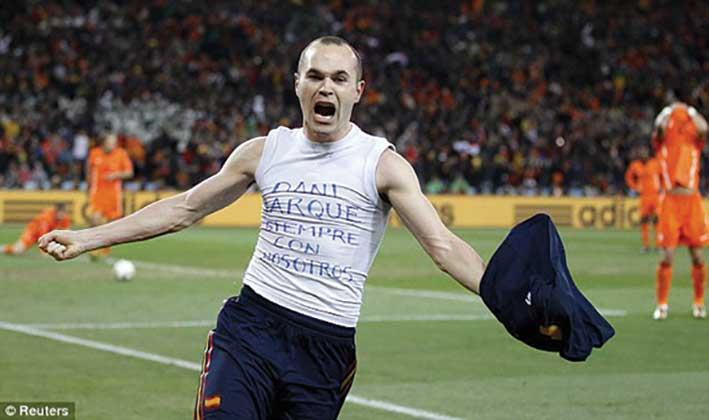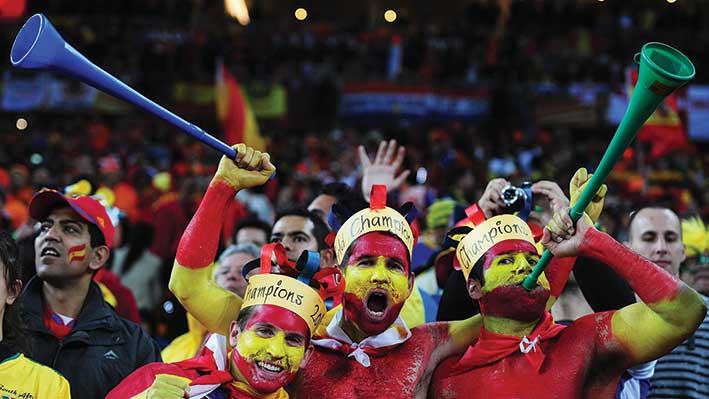Spain’s reputation as the great underachiever in world football was a characteristic it desperately wanted to ditch.
Adopting quick-passing tiki-taka tactics, Spain won the 2008 European Championship. That went a long way to ridding the team of its unwanted tag, but the country really came through two years later at the World Cup in South Africa.
True to historic form, however, Spain lost its first group match against Switzerland. That raised the prospect that a team blessed with some of the world’s best players, including goalkeeper Iker Casillas and midfielders Xavi Hernandez and Andres Iniesta, would not even make it to the knockout stages of a tournament it had entered as a favourite.
Spain then ground out victories over Honduras and Chile to end up winning the group, but the team was hardly sparkling.
In South Africa, Spain failed to deliver the kind of attacking play that had marked its ascent to the top of the world rankings. Grinding out 1-0 victories over Portugal, Paraguay and Germany, Spain was finally in the World Cup final. They would face the Netherlands, which also had a point to prove after losing its previous two finals back in the 1970s.

Spain’s Andres Iniesta runs off to celebrate scoring the winning goal in the 2010 World Cup.
After a match that was riven with cautions, Spain became the eighth country to win the World Cup — and they did it with another 1-0 victory. The disappointing final appeared to be headed for a penalty shootout until a goal from Iniesta four minutes from the end of extra time.
In victory, Spain became the first European team to triumph outside its continent. It would go on to defend the European Championship two years later in Poland and Ukraine with a far more attacking approach and turned up in Brazil for the 2014 World Cup expected by many to triumph again.
But that proved to be one tournament too many for one of the great teams in history, which incredibly lost 5-1 to the Netherlands in its opening group match.
They couldn’t win another title that year, but they were underachievers no more.
Only six out of 13 UEFA teams progressed to the last 16, a record low since the round of 16 was adopted in 1986. Still, the final was played by two European teams. Both of the finalists from the preceding tournament, winners Italy and France, were eliminated in the initial stage of the competition, the first time this happened at a World Cup. It was also only the third time the reigning champions were eliminated in the first round of the finals (after Brazil in 1966 and France in 2002). Surprisingly, New Zealand, a team projected by many not to attain even one point in Group F, ended the tournament as the only undefeated team after drawing their three group matches, but they finished behind Paraguay and Slovakia and were eliminated.

Spanish supporters celebrate their nation’s maiden title by blowing the vuvuzelas.
The South American teams performed strongly, with all five advancing to the knockout stages (four as group winners), and four made the quarter-finals (the only team from South America to not make it this far was Chile, who lost to Brazil); but only Uruguay advanced to the semi-finals.
Only 145 goals were scored at South Africa 2010, the lowest of any FIFA World Cup since the tournament switched to a 64-game format. This continued a downward trend since the first 64-game finals were held 12 years earlier.
The 2010 finals amplified international public awareness of the vuvuzela, a long horn blown by fans throughout matches. Many World Cup competitors complained about the noise caused by the vuvuzela horns, including France's Patrice Evra, who blamed the horns for the team's poor performance. Other critics include Lionel Messi, who complained that the sound of the vuvuzelas hampers communication among players on the pitch, and broadcasting companies, which complained that commentators' voices were being drowned out by the sound.